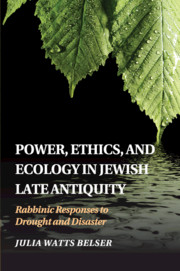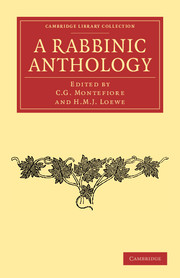Power, Ethics, and Ecology in Jewish Late Antiquity
Rabbinic Responses to Drought and Disaster
£30.99
- Author: Julia Watts Belser, Georgetown University, Washington DC
- Date Published: March 2020
- availability: Available
- format: Paperback
- isbn: 9781107533929
£
30.99
Paperback
Other available formats:
Hardback, eBook
Looking for an inspection copy?
This title is not currently available on inspection
-
Rabbinic tales of drought, disaster, and charismatic holy men illuminate critical questions about power, ethics, and ecology in Jewish late antiquity. Through a sustained reading of the Babylonian Talmud's tractate on fasts in response to drought, this book shows how Bavli Taʿanit challenges Deuteronomy's claim that virtue can assure abundance and that misfortune is an unambiguous sign of divine rebuke. Employing a new method for analyzing lengthy talmudic narratives, Julia Watts Belser traces complex strands of aggadic dialectic to show how Bavli Taʿanit's redactors articulate a strikingly self-critical theological and ethical discourse. Bavli Taʿanit castigates rabbis for misuse of power, exposing the limits of their perception and critiquing prevailing obsessions with social status. But it also celebrates the possibilities of performative perception - the power of an adroit interpreter to transform events in the world and interpret crisis in a way that draws forth blessing.
Read more- Enables readers to engage deeply with a single rabbinic work
- Illuminates the significance of rabbinic narrative in its historical and cultural context
- Written in an accessible style that makes the book suitable for scholars and students from diverse fields
Reviews & endorsements
'Reading this volume was both easy and enjoyable. At times, Belser's prose is poetic. (A rare statement for an academic tome!) … Belser's volume offers many fresh insights into an oft-studied tractate. While this book might focus on disaster, as a work of scholarship, it is in fact a success.' Jordan Rosenblum, AJS Review
See more reviews'This excellent study of Bavli tractate Ta'anit investigates the nexus of meaning that links Jewish conceptions of ecology, theology, and ethics … The carefully orchestrated sequence of chapters leads from a focus on droughts and rain as signs to the inherent ambiguity of natural signs, the protective power of merit in view of disasters, charisma and ritual fasting, the limits of human charismatic power, and the critique of surface appearances. An introduction that outlines the main themes and a short conclusion entitled 'Power and Perception' in Bavli Ta'anit frame the analytic chapters … I can highly recommend the book to students and scholars of ancient Judaism, rabbinic literature, ancient Christianity, Graeco-Roman and Persian culture. It constitutes an important contribution not only to studies of the Babylonian Talmud but also to the wider study of holy (wo)men in late antique society.' Catherine Hezsec , Theologische Literaturzeitung
Customer reviews
Not yet reviewed
Be the first to review
Review was not posted due to profanity
×Product details
- Date Published: March 2020
- format: Paperback
- isbn: 9781107533929
- length: 251 pages
- dimensions: 229 x 152 x 14 mm
- weight: 0.376kg
- availability: Available
Table of Contents
Introduction
Encountering the Bavli: an introduction for readers new to the Babylonian Talmud
1. Covenantal ecology and the discourse of natural signs
2. Reading the natural world: interpretation and meaning in Bavli Taʿanit
3. Merit in the midst of danger: falling walls, faltering houses, and the power of performative perception
4. Charisma and ritual fasting for the sake of rain: parrhesia, penitence, and the construction of intimacy before God
5. Confusing the fathers: charisma and the limits of human power
6. Hiddenness and holiness: gender, class, concealment, and the critique of rabbinic status-seeking
Conclusion.-
General Resources
Find resources associated with this title
Type Name Unlocked * Format Size Showing of
This title is supported by one or more locked resources. Access to locked resources is granted exclusively by Cambridge University Press to lecturers whose faculty status has been verified. To gain access to locked resources, lecturers should sign in to or register for a Cambridge user account.
Please use locked resources responsibly and exercise your professional discretion when choosing how you share these materials with your students. Other lecturers may wish to use locked resources for assessment purposes and their usefulness is undermined when the source files (for example, solution manuals or test banks) are shared online or via social networks.
Supplementary resources are subject to copyright. Lecturers are permitted to view, print or download these resources for use in their teaching, but may not change them or use them for commercial gain.
If you are having problems accessing these resources please contact [email protected].
Sorry, this resource is locked
Please register or sign in to request access. If you are having problems accessing these resources please email [email protected]
Register Sign in» Proceed
You are now leaving the Cambridge University Press website. Your eBook purchase and download will be completed by our partner www.ebooks.com. Please see the permission section of the www.ebooks.com catalogue page for details of the print & copy limits on our eBooks.
Continue ×Are you sure you want to delete your account?
This cannot be undone.
Thank you for your feedback which will help us improve our service.
If you requested a response, we will make sure to get back to you shortly.
×




